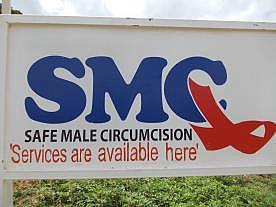Culture and male circumcision clash in Mbale, Uganda

“Stand straight and look into my eyes. Don’t twitch a muscle. I see you’re crying. You are crying for it. Crying to be cut to look like your father. But Imbalu is not laughter. Imbalu is a shaving knife.”
Among the Bamasaba (also known as the Gishu) of Mbale and Mount Elgon region in Eastern Uganda, every leap year is a traditional circumcision year. To them, male circumcision is a cultural rite for initiation into manhood. This practice dates back to the days of their forefathers. As described by Professor Timothy Wangusa, in Upon This Mountain, circumcision (known as ‘Imbalu’ among the Gishu) is for strength, valour and manhood.
But male circumcision is no longer just a cultural or religious obligation, circumcision – when carried out safely in a sterile environment – is now a powerful tool used by health facilities to contribute towards a reduction in new HIV infections among men. There have, as expected, arisen a number of confusions on the difference between circumcision for culture, circumcision for religious purposes as performed by Muslims or Jewish communities, and circumcision for prevention of new HIV infections for men.

In Rwanda, East Africa, the army was issued with a dictum that officers and men should be circumcised as a measure to reduce new infections from HIV. If you want to be in the army, get circumcised.
Circumcision being mandatory for all Muslims, Muslim surgeons – who are extremely experienced in performing mainly neonatal circumcision – find themselves better positioned to perform the procedure than other groups as they, unlike the cultural circumcisers, carry it out in a sterile setting. It is no wonder that in Uganda, Muslim-founded health facilities have been doing brisk business, charging up to US$40 dollars for one operation.
However, the proliferation of circumcision ‘surgeons’ may also be a menace to medically sound circumcision procedures. For it is now very easy for a person to claim they have shiftted from being a traditional cultural circumcision ‘surgeon’ to clinical male circumcision surgeon, who may claim to carry out SMC but is not using the sterile equipment.
However, the greatest nightmare to male circumcision came recently when traditional surgeons in Mbale went on a rampage to circumcise every male soul in the area. Because of the Imbalu craze among the Gishu, many people were forced into getting circumcised, even when they do not subscribe to that culture. Police was forced to fire tear gas, to save many men from being forcefully circumcised.
District Police Commander Michael Angucia was not amused. “I am not trying to fight the culture of the Bamasaba but the way the practice is handled may cause tribal conflicts. Several people have fled the town, property robbed and business is being paralyzed. We have deployed on the streets to arrest the hooligans,” he said.
Apparently, the reason behind the forced circumcision campaign was that the native Gishu men were accusing the non-Bagisu men for having sex with their women (Gishu women) and infecting them with sexually transmitted infections (STIs).
Aggrey Wamundu, a leader of the Gishusurgeons, said: “The Government of Uganda recently introduced male circumcision as a way of mitigating the spread of HIV/AIDS. We therefore don’t see why these guys [non- Gishu] have not gone to hospitals for the surgical procedure. This is why we have decided to forcefully circumcise them so, as to save our girls from STIs.”
One wonders why a community with a proud culture has resorted to actions reminiscent of the children in the Lord of the Flies in the name of circumcision. They have ransacked homesteads, stolen property, invaded huts and villages and put up road blocks, requiring men to remove their pants in order to be certified as circumcised.
This may be the time for Doctors Opposing Circumcision to say ‘we told you so’, but at this level one may discern more of their arguments if the rampage with which male circumcision in Uganda district of Mbale was conducted is not stopped.
Such forced circumcision is likely to create a bias against a practice with outstanding medical benefits. Unfortunately, the Gishu culture, which euphemistically refers to circumcision as ‘facing the knife’, goes beyond the limits of using safe male circumcision as a combined preventive measure for HIV as anticipated by Ministries of Health in Sub Sahara Africa, UNAIDS and the World Health Organization.

